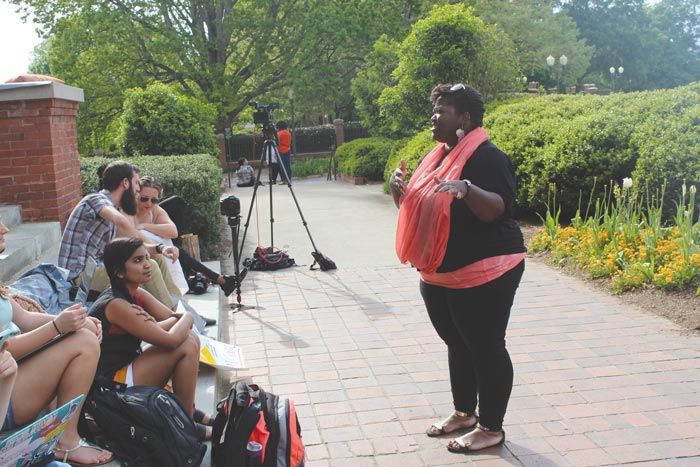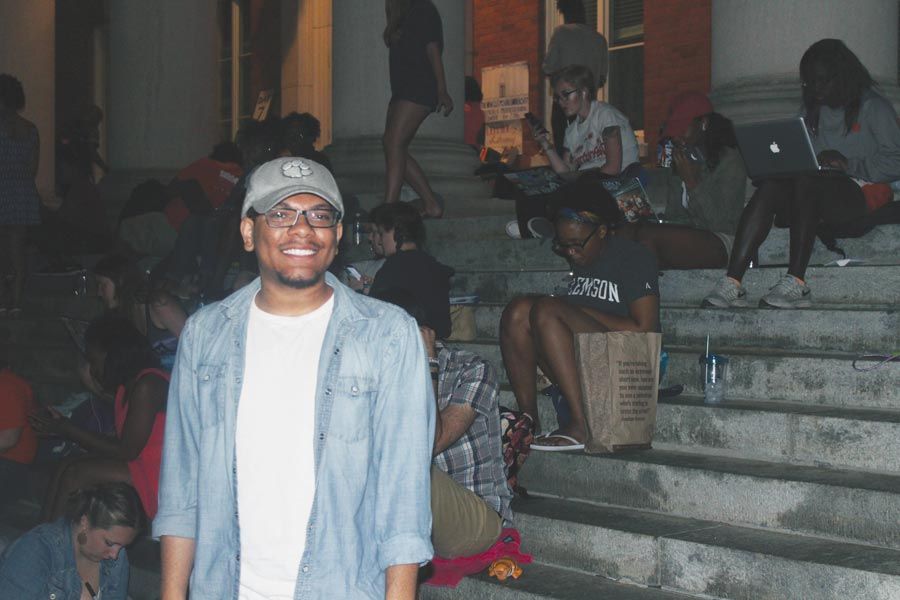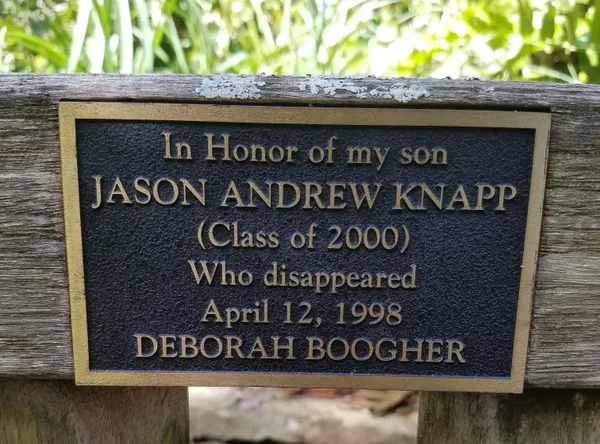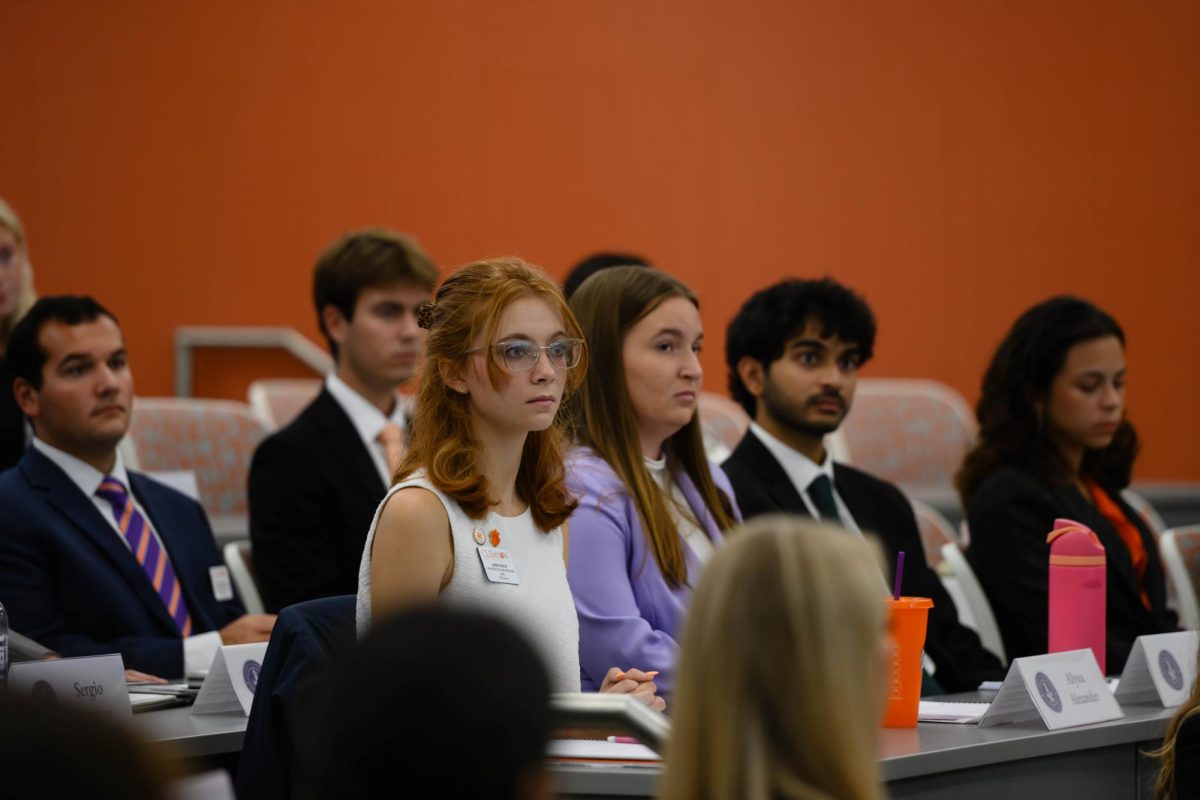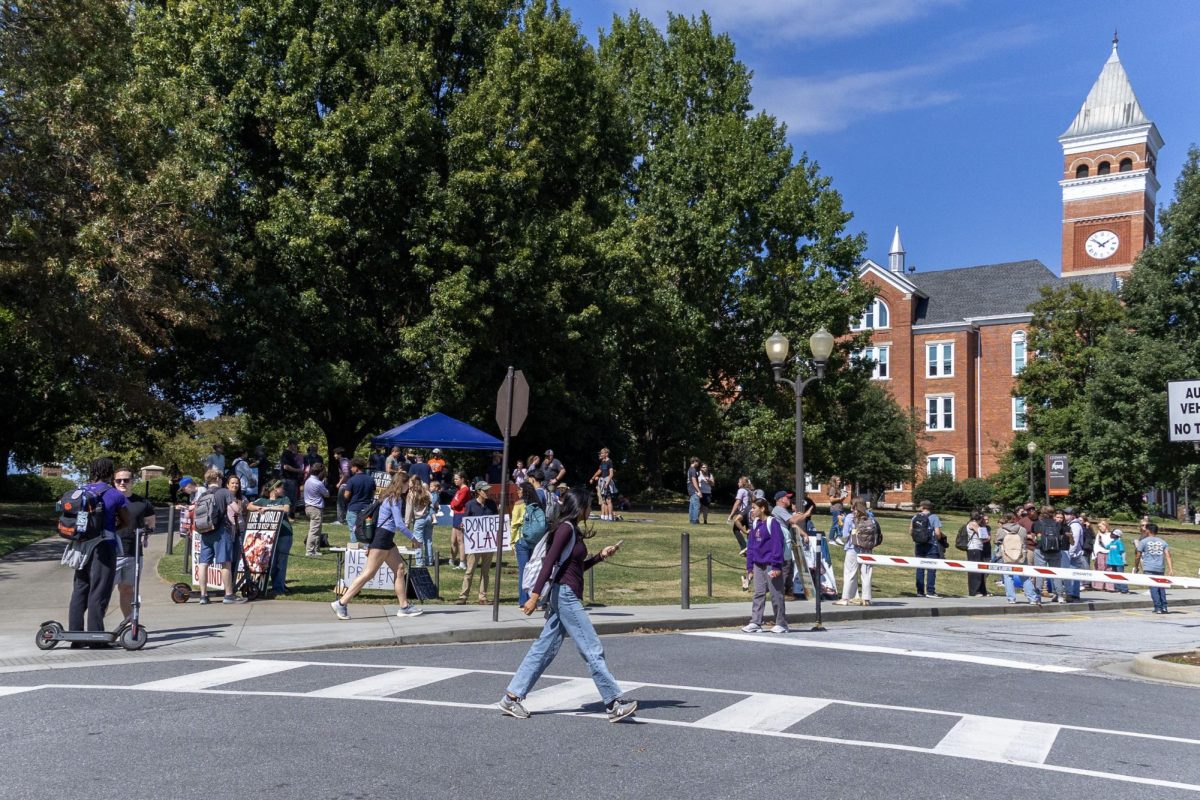When Professor Jumah Taweh visits home in Pennsylvania, her mother Esther always makes the same meal.
“My favorite food is palava sauce and rice,” Taweh said. “My mom knows to keep that waiting for me so I can eat and be happy.”
Palava sauce is a stew from West Africa made of spinach, pumpkin seeds, shrimp, meat and fish. For Taweh, whose birthplace is Liberia, the dish is but one of the many Liberian customs she cherishes.
Taweh, a communication studies professor, held her Comm 2500 class at Sikes Hall on Tuesday. It was a free day for students to work on a project. Then she had a change of plans.
“I decided to have them come outside … because it’s a lovely day and … a major element of public speaking … is using your voice for something that matters to you, and the [protesters] have been using their voice to advocate for what’s happening … and what continues to happen at the university,” Taweh said. She wanted her students to “see a real life experience of public speaking and how people can use their voice to produce positive change.”
Class attendance is optional, so students weren’t penalized for not attending. Taweh, wearing a pink scarf and earrings in the shape of Africa, told her students that she didn’t invite them to the sit-in because she wanted them to join the protest, but because she wanted them to be aware of what’s happening on campus.
The majority of her students showed up at the steps.
Taweh said the class was a positive experience. Some students articulated explanations for the sit-in. Others were unsure of the protesters’ motivations. The class discussed their grievances, specifically addressing the Tillman Hall controversy.
“Some of my students didn’t know that it once was called ‘Old Main,’ and … we understand we can’t change the name of the building, but we can change how we refer to it,” Taweh said.
Taweh’s family immigrated to America when she was nine. Because she was born in Liberia, Taweh identifies as a Liberian-American, as well as a person of color.
“I’m still in Liberian culture, so my frame of reference is different from someone whose family is African-American or black,” she said.
Sharing experiences of racism as a person of color on campus, Taweh recounted last Friday — day three of the sit-in — when she spent the night at Sikes. That evening, passengers drove by in a vehicle and “yelled the n-word and told people to ‘go home,’” according to Taweh.
“If anyone … in the majority group was walking by, they might be like, ‘Oh, well that was rude,’ but for people who were here, that hit home, and that hurt because not only are you going out of your way to give us a racial slur, but you’re doing it intentionally.”
Professor Taweh also shared the experiences of students of color who confide in her. Several students have told Taweh that entire classrooms have physically turned toward them, as persons of color, to be the representatives of the African-American or black community.
Senior Nigel James, who identifies as biracial, talked about his experience as a person of color. In his freshman year, a student in James’ English class used the word “coloreds” to refer to African-Americans.
“And the teacher … let him continue, and she looked at me. I was the only black person in this English class, and my reaction was … to figure out what was more logical,” James said. Either he could get angry and tell the student that the word is inappropriate or just say nothing.
“Being the only black person … in that situation where the teacher’s looking at me to see if I’m going to react and students are looking at me to see if I’m going to react, I felt uncomfortable.”
James, who plans to attend law school and is currently teaching himself French, said that the professor could have used the incident as a teachable moment.
“I think in that setting, it’d be great to talk about the history of the word. Taking a moment to address it and say, ‘Hey, the word colored is really archaic.’”
An incident like the one that happened at Sikes last Friday happened to James (again in his freshman year) when he and some friends were outside Manning.
“We were just talking and walking … and a group of Caucasian students in a truck drove by and said the n-word,” James said. “It wasn’t like we provoked them. It wasn’t like we were doing anything wrong. It just happened, and we never figured out why.”
James said the incident hurt: “It hurts a lot because being in the 21st century and in a top-20 institution, you don’t expect those things to happen.”
Sophomore La’ Portia Perkins, who identifies as African-American, said that racism directed toward her has always been either behind her back or unintentional.
“My suite mates used slurs like the n-word and others that would not be appropriate to use for other people,” Perkins said. “They didn’t know I was around, but you could hear it through the walls.”
Perkins, a wildlife and fisheries biology major and avid meditator, said people tell racist jokes right in front of her. She said sometimes people think she’s in on the joke as well.
“Some people do expect me to laugh,” Perkins said. “It hurts my feelings, and I don’t think it’s funny.”
The perception of “the angry black woman” is something that Perkins has learned to ignore.
“If I am an angry black woman, I’m angry with a reason. I’m not going to sit up here and be upset over nothing,” she said. “Especially if it has to do with you putting prejudice or discrimination in my face.”
Professor Taweh has also dealt with preconceived notions as a person of color. For one class, she used clips from “mostly majority films,” like “Forrest Gump” and “The Great Gatsby” — films with a predominantly white starring cast.
“None of your videos were popular in the black culture,” a student said to Taweh, who said she didn’t take offense at the time.
“I understand that my skin is brown. Some people are going to make associations, and some people don’t understand why I don’t consider myself African-American,” Taweh said. “I told her that I really don’t have a lot of experience or knowledge on films that are popular in African-American culture.”
Taweh didn’t want to make the student feel uncomfortable for the rest of the semester, and she continued the lesson.
“I saw her again after the semester ended, and she referenced it,” Taweh said. Taweh joked that her mother decided what she could and could not watch when she was little.
“So we had the conversation about my identity, and she said that she didn’t know, and I said you couldn’t know because we associate with each other based off our physical traits without knowing more.”
Taweh said that the student’s initial question ended up fostering a dialogue in which they both could learn something.
Dialogues like this materialize at Taweh’s dinner table, back in Pennsylvania. Her favorite dish, palava, translates from Portuguese as “discussion.”
Senior Nigel James, a biological sciences major, talked about his experiences with racism as a biracial student on campus at Sikes Hall Tuesday night.



